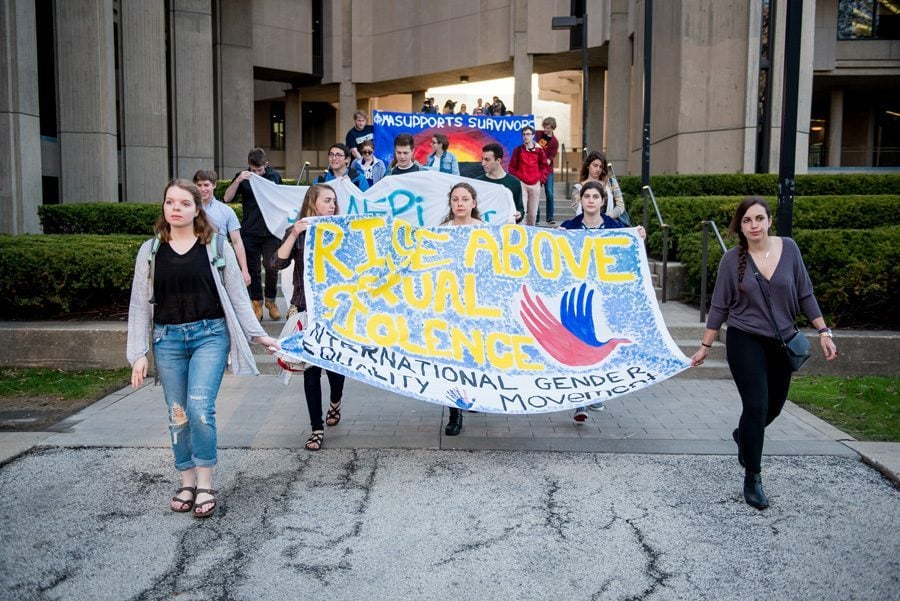Opposition to proposed Title IX changes spurs students to submit formal comments
Daily file photo by Ben Goldberg
Student protesters during the 2016 Take Back the Night annual march. Students concerned over how proposed changes to Title IX will affect survivor protections are submitting comments to the federal register to express their disapproval.
January 29, 2019
Concern over the U.S. Education Department’s proposed changes to Title IX is driving Northwestern students to submit public comments condemning the changes and their effects on campus safety and protections for sexual assault survivors.
The implementation of Title IX — which bars gender discrimination in federally-funded schools — was historically handled through Dear Colleague letters, guidance documents from the Education Department that aren’t legally binding. The new changes would alter this system by providing stricter legal rules for how colleges and universities have to respond to reports of violations.
Under the proposed rules, schools would give defendants the right to cross-examine their accusers, narrow the definition of sexual harassment and alter the terms under which a university is required to investigate an incident, among other changes.
The proposal has caused some students to fear for their safety on campus — and in response, some are letting the Education Department know how they feel.
Associated Student Government submitted a comment to the Federal Register Sunday after passing a resolution during the Jan. 23 Senate meeting. ASG’s submission was a compilation of comments students wrote at a panel event earlier this month.
Comment writing was an important opportunity to engage the community, ASG President Emily Ash said in a news release, adding that “the engagement with this was so empowering, and it shows how important Title IX is to our community and for others across the country.”
The Federal Register gives the public an opportunity to comment on proposed rules, including Title IX, before federal agencies finalize them.
Some students, like Weinberg first-year Abigail Roston, made comments on their own. In her comment, Roston cited the narrowed definition of sexual harassment and the assumption of innocence for the accused party as “particularly concerning.”
“Ultimately, I felt compelled to comment due to the blatant injustices riddled throughout the proposed changes,” Roston said, who is a member of Planned Parenthood Generation Action Northwestern, a student group that pushed its members to comment on changes made by the Trump administration. “I knew that I could make my voice heard by commenting on the Federal Register.”
Students aren’t the only ones expressing their opinions.
Spanish Prof. Shannon Millikin said the proposed changes “enable sexual assault,” since they don’t require schools to investigate off-campus incidents, and force an “intentionally intimidating process” on survivors.
“The proposed changes protect rapists instead of survivors, and that should make all of us outraged,” Millikin told The Daily. “Rape and sexual assault should not be pervasive and they should not be normalized.”
That “continuous activism,” like making public comments, is important for positive political change, she added.
Roston said it felt like her “civic duty” to make comments in response to policies with which she didn’t agree, regardless of whether the comments will actually spur the Education Department to alter the proposed changes.
“We are actively choosing to stand up for college students across the country in defense of their ability to report sexual harassment,” she said. “Even if nothing comes of my comments, I participated in discourse surrounding an issue I adamantly disagree with.”
The University has said it will also submit a comment before the period ends Wednesday.
Email: [email protected]


